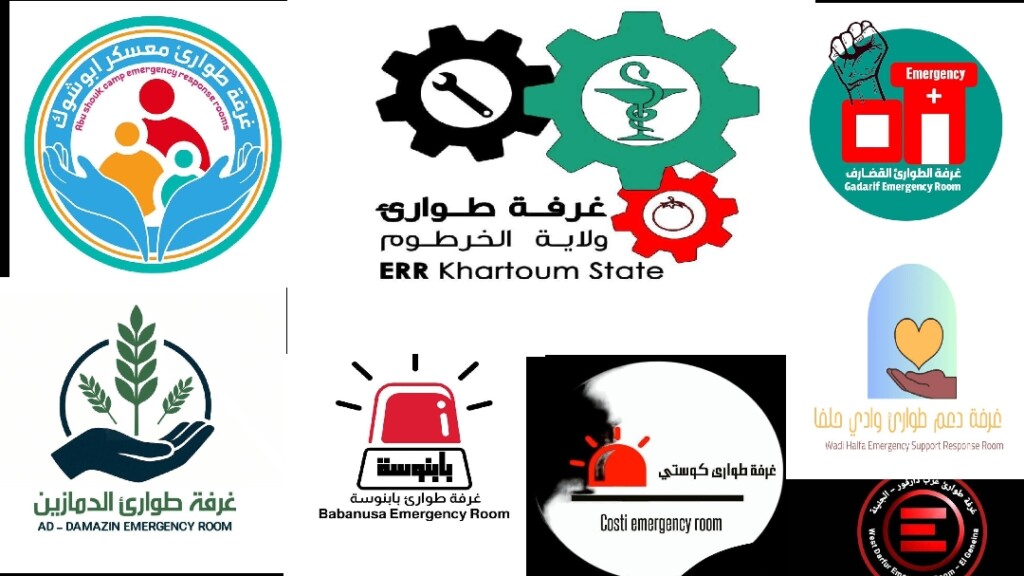Emergency Response Rooms of Sudan win Rafto Prize 2025

Emergency Rooms logos
The annual Rafto Prize 2025, awarded by the Norwegian Rafto Foundation for Human Rights, is to be awarded to The Emergency Response Rooms of Sudan (ERRs) for their courageous work to preserve the most fundamental human right – the right to life, “saving lives and strengthening communities in one of the worst humanitarian crises of our times.”
In a statement motivating the award this week, The Rafto Foundation for Human Rights highlights that ERRs are grassroot networks that emerged in the wake of the war in Sudan in 2023. They consist of thousands of volunteers who engage in collaborative, community driven efforts to meet urgent humanitarian needs of others, at great personal risk. The ERRs save lives and maintain human dignity in a place of misery and despair. Their innovative mutual aid efforts through citizen participation contribute to developing a civil society and is essential to building a better future for Sudan.
The Professor Thorolf Rafto Memorial Prize for Human Rights (i.e. the Rafto Prize) has been awarded every year since 1987. The prize sheds light on human rights violations and gives recognition to human rights defenders who deserve the world’s attention. There are no geographical or issue constraints regarding the individuals or organisations that may receive the prize.
“The strength of the Emergency Response Rooms is rooted in the deep Sudanese culture of neighbourhood community support. This is also an exercise of citizen participation, a rebirth of civic life, maintaining the social fabric and the creation of a new civil society that celebrates diversity and adopts human rights and democratic practices.” (Emergency Response Rooms)
Emergency Response Rooms: Innovative and home-grown networks of collective support
After the brutal war between the Sudanese Armed Forces (SAF) and the Rapid Support Forces (RSF) broke out in April 2023, the Sudanese state collapsed. As a consequence, civilians have an enormous need for humanitarian assistance. In a desperate attempt to save lives, ordinary Sudanese took matters in their own hands and formed self-help groups to offer services supporting basic life, welfare, and human dignity through Emergency Response Rooms (ERRs). Through their efforts ERRs are also building an active and engaged civil society, a cornerstone for a democratic state.
The ERRs originated in Khartoum and has spread to other conflict areas of Sudan. To mitigate excessive loss of life and human suffering, ERRs provide key services such as health, food, water, body retrieval and burial. The ERRs also work on monitoring, documenting, and responding to cases of sexual violence. They are functioning in most parts of the country, currently covering 13 of the 18 states.
The ERRs are rooted in the rich traditional Sudanese customs of neighbourhood community support and practice of solidarity. They are carrying on the values of the Resistance Committees who were active in the revolution that ended the rule of long-time dictator Omar Al-Bashir in 2019. The ERRs are not a traditional humanitarian organization. The rooms have a flat and non- hierarchical structure with each local chapter having the autonomy over its budget and activities. The ERR model is dynamic and innovative in its ability to mobilize locals, thus improving community resilience in humanitarian response and human rights protection. This model builds upon collective work and provides communities with experiences of grassroot mobilization and democratic governance structures where the people are at the centre.
In addition to assisting local communities with life supporting services, the ERRs also represent an exercise of citizen participation and civil society engagement. These experiences are essential in creating bases for good governance and cultivating hope for a peaceful and democratic future for Sudan, where human rights and human dignity shall be respected.
Despite the desperate situation in the conflict areas, ERRs have received limited financial support from international organizations. They continue to rely on ad hoc in-kind donations from volunteers and members of the communities where ERRs operate, and the Sudanese diaspora has been a key source of financing.
ERR volunteers do not receive the same protection as international humanitarian workers in an armed conflict. The volunteers risk their lives in their line of duty. They also face threats of beatings, torture, arrests, and robberies from both the Rapid Support Forces and from the Sudanese Armed Forces. According to the Aid worker Security Database, 25 aid workers were killed and 64 survived other kinds of violent attacks in Sudan in 2023, and more than a 100 ERR volunteers have been killed since the conflict began. Considering the continued violence, these numbers are likely to be the tip of the iceberg.
An overlooked humanitarian catastrophe
The 2019 revolution led by courageous Sudanese, ended Omar Al-Bashir’s close to 3-decade authoritarian regime, and galvanised hope for a free, democratic, and prosperous Sudan. However, people’s aspirations were squashed in 2021, when the military took over from the civilian transitional government. The military takeover derailed Sudan’s path to democracy. Despite carrying out a successful coup, the military was divided on the way forward for Sudan, leading to a fierce power struggle between the leaders of the Sudanese Armed Forces and the Rapid Support Forces.
Years of authoritarian rule had failed to establish a thriving economy in Sudan. Therefore, when the violence erupted between the military and the Rapid Support Forces, the disintegration of livelihoods escalated. The country is now torn by death, hunger, disease, displacement and general despair. Since the outbreak of the war, more than 150 000 people have died. More than half of the country’s population–30 million people–need humanitarian assistance. 25 million face acute food insecurity. 12 million have fled from their homes. Women and children have been disproportionally affected, including by an alarming rise in gender-based violence.
The war in Sudan receives limited media attention and international aid. The lack of attention has exacerbated the suffering of the Sudanese people, as the international community’s response remains insufficient to meet the overwhelming needs. The suspension of funding to Sudan by the new US administration has worsened the already precarious humanitarian situation. Today, the Sudanese people endure one of the worst humanitarian crises of our time.
A call to defend human life and dignity
In this dire situation, ERR members continue to provide life-saving mutual aid, strengthening communities and keeping a hope for a democratic Sudan alive under almost impossible conditions.
The Rafto Prize 2025 honours the Emergency Response Rooms and the thousands of individuals protecting the right to life and health, who are building hope in Sudan, at tremendous risk to their own lives. The prize is also a recognition of the significance of grassroot mobilization and collective effort in ensuring basic human rights in times of conflict.
We call on the Rapid Support Forces and the Sudanese Armed Forces to respect International Humanitarian Law and protect humanitarian relief workers.
We call for a ceasefire and an end to the fighting in Sudan and for protection of civilian lives.
We call for justice for the victims of the war in Sudan and an end to impunity. Those who commit gross human rights violations against civilians must be held accountable.
We call on the international community to look to Sudan and engage with key Sudanese actors such as the Emergency Response Rooms in a bid to find long lasting peace. The need for protection of human rights and humanitarian assistance is becoming greater by the day. In these trying times, we must all stand in solidarity with the people of Sudan.











 and then
and then